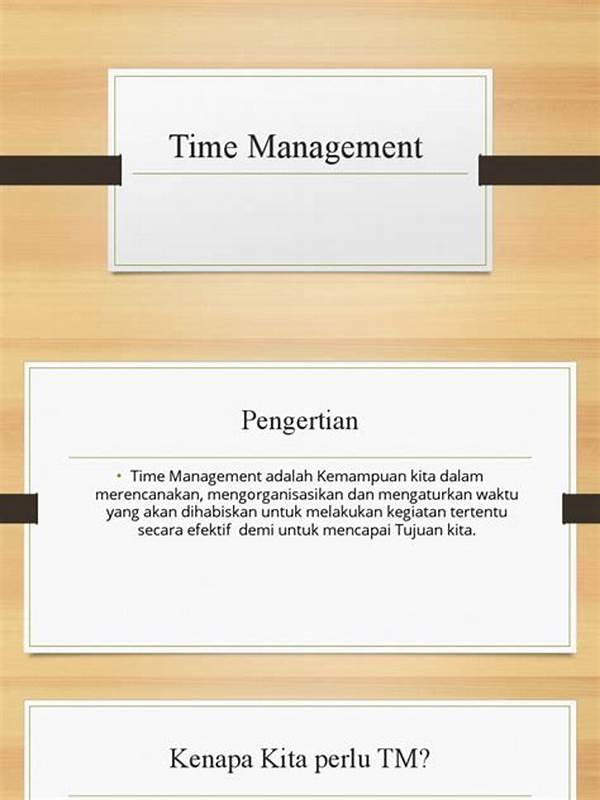In the hustle and bustle of our everyday lives, time management emerges as not merely a skill but an essential ingredient for success. Imagine being able to handle multiple tasks effortlessly, confidently ticking off your ever-growing to-do list, and still having time left for yourself. This may sound like a fantasy, but with effective time management, it’s an achievable reality. Whether you’re a student drowning in assignments, a professional juggling between meetings, or a stay-at-home parent managing the household chaos, mastering time management can be your secret weapon. Today, the ability to prioritize, plan, and execute tasks efficiently is more crucial than ever. With the world demanding more of our time and energy, learning how to manage our schedules effectively can dramatically boost productivity and reduce stress.
Read More : Top 5 Time Management Books Reviewed
Time management is not just about keeping a diary or using a planner; it’s about strategically investing your time in activities that bring the most value to your personal and professional life. When you learn the ropes of time management, you begin to notice a remarkable transformation. Your mind becomes clearer, focused, and surprisingly less cluttered. You start to achieve more in less time, freeing up space for creativity and innovation. Just imagining the possibilities creates a sense of desire and urgency—a desire to transition from chaos to calm and the urgency to start right now.
Let’s visualize a scenario: It’s Friday afternoon, your workweek was chaotic, and tasks are glaring at you from your to-do list, undone. You sigh as the weekend looms, filled with more commitments. Now, visualize another scenario where each task is checked-off, deadlines are met stress-free, and the weekend beckons with the promise of leisure. The key difference between these scenarios? Effective time management. Through the lens of storytelling, we see how transforming chaos into harmony is possible with the right tools and techniques. This is not just a tale; testimonial evidence supports that those proficient in time management sleep better, live happier, and achieve their goals more consistently.
There are numerous strategies you can implement starting today. From prioritizing tasks using methods like the Eisenhower Box to eliminating distractions by creating a focused work environment, there are an abundance of resources waiting to be explored. Why wait to introduce these changes into your life? Step into the realms of time management, embrace the techniques, and watch yourself flourish. Remember, every successful journey begins with a single step, and mastering time management could be that first step towards the life you’ve always dreamed of.
Benefits of Effective Time Management
Mastering the art of time management reaps numerous benefits that extend far beyond increased productivity. Firstly, with effective planning and prioritization, you reduce stress and anxiety levels considerably, leading to a healthier state of mind. Secondly, time management techniques provide a wonderful balance between professional commitments and personal time, ensuring you never miss out on essential life moments. Thirdly, it empowers you to make better decisions by systematically evaluating the importance and urgency of tasks. Lastly, by improving efficiency, you open avenues to futuristic opportunities, enabling career growth and personal development.
The Building Blocks of Time Management
Effective time management is often misconstrued as a mechanical, robotic process where one strictly follows a timeline. However, it’s more of an art that intertwines with your daily routine seamlessly. This art encompasses setting clear goals, breaking them into manageable tasks, and executing them using predefined priorities. The essential building block of this art is understanding the ‘why’ behind each task which ultimately acts as a motivator to stay focused and committed.
Experimentation plays a crucial role here. Trial and error help in identifying what works best for you. Whether it’s the Pomodoro Technique inspiring short bursts of productivity or time-blocking giving structure to your day, different strategies satisfy different needs.
Implementing Time Management Techniques
Launching into the realm of efficient time management, discipline is your biggest ally. Techniques like setting SMART (Specific, Measurable, Achievable, Relevant, Time-bound) goals can provide a solid foundation for success. Decluttering your workspace and mind both physically and digitally is also paramount—it removes unnecessary stressors and distractions.
Furthermore, leveraging digital aids like calendar apps, reminder tools, and productivity software can immensely support your time management game. Yet, it’s crucial to remember that technology is a tool, not a replacement for human intent.
Overcoming Time Management Challenges
Despite recognizing the importance of time management, challenges carve a difficult path toward its implementation. Procrastination, the eternal foe, obstructs progress. However, understanding its root cause—whether it’s fear of failure or overwhelming tasks—can help tailor strategies to combat it.
Another significant hurdle is overcommitting, which stems from an inability to say no. Learning to prioritize and decline commitments diplomatically is integral to better time management. Remember, you’re not a superhero; it’s impractical to accomplish everything at once.
Finding ways to manage energy alongside time is significant yet often overlooked. Recognizing peak productivity hours and tailoring your demanding tasks around them can substantially increase efficiency. Likewise, embracing breaks and relaxation is vital for rejuvenation.
Why You Need Good Time Management
Imagine making it out of your workday with an unburdened mind and still having leftover time to indulge in hobbies, socialize, or simply relax. Good time management transforms this dream into reality by aligning daily actions with long-term personal and professional goals.
Remember, every minute saved equates to a minute earned, which, when compounded, fosters a positive, content, and fulfilled life. Creating a lifestyle that embraces proximity to family, fulfillment of dreams, and relentless self-improvement is possible with efficient time management.
Success Stories and Testimonials
Consider Emma, a high-spirited professional who balanced her job alongside an intense passion for painting. Before introducing time management into her life, she often felt overwhelmed. However, the practice of blocking her calendar for painting sessions and sticking to a priority-based task list granted her serenity and satisfaction in both aspects of life.
Emma’s story, albeit unique, is an anecdote echoed by many who have transformed their lives by learning success through effective time management. It’s not just an individual pursuit. Sharing experiences leads to a collective growth, fostering a supportive community that advocates productivity and a balanced lifestyle.
Conclusion
Effectively managing time involves integrating multiple strategies tailored to suit individual needs and lifestyles. Coupled with dedication and consistency, it promises a realm where work-life balance prevails over chaos. Thus, the journey of mastering time management, although challenging, is indeed fulfilling. The question beckons—are you ready to embark on this transformative journey towards living your best life yet?
Below are nine essential takeaways related to the “materi time management” that reinforce its significance:
Mastering “materi time management” is akin to unlocking a powerful life skill that catalyzes improvement and growth. Through conscious practice and experimentation, one can evolve from chaotic spontaneity to disciplined productivity. As we delve into the realm of time mastery, remembering its benefits fuels our journey. From navigating the challenges to refining techniques, the art of time management bridges the gap between present actions and future aspirations.
Exploring varied methodologies unveils personalized approaches to achieving optimal time management. Techniques like prioritization, delegation, and time blocking structure tasks effectively. The Eisenhower Matrix, for instance, helps dissect what’s urgent from what’s important. Time auditing reveals how we spend our hours, offering insights for tangible improvements.
The Role of Flexibility in Time Management
A paradox of time management is its call for both structure and flexibility. Adapting plans, adjusting priorities, and learning from setbacks form a critical component of this strategy. Practicing flexibility strengthens resilience and nurtures personal adaptability, crucial traits for thriving in our dynamic world.
By analyzing our time through audits, employing efficient techniques, and embracing flexibility, we can enrich our lives, nurture ambitions, and ultimately, enjoy the serenity of time well spent. Do not wait for change to knock on the door; step into the proactive lane, adopting superior time management for enriched living.


